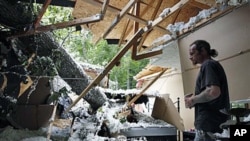Economic experts estimate Hurricane Irene caused about $7 billion in damage as it slammed into Eastern Seaboard of the United States, killing at least 33 people.
The $7-billion estimate is lower than earlier predictions and comes from the Kinetic Analysis Corporation in Maryland. The company uses statistics and mathematical models to study the costs of disasters.
The storm first hit the southern U.S. coastal state of North Carolina, damaging that area's tourism industry.
Evacuations and destruction
The hurricane then made its way north to New Jersey and New York, where it threatened one of the most densely-populated areas of the United States, and key parts of the financial system based in New York City.
Along the way, Hurricane Irene cut off electricity to about 4 million people, prompted two-and-a-half million people to evacuate, and damaged roads, bridges and buildings with high winds, floods and falling trees.
An expert in hurricanes and economics, Dr. Roger Pielke, says the economic cost of hurricanes has risen many-fold over the past few decades, because millions of people in the United States have moved to coastal areas that are vulnerable to storms.
"Along the entire Gulf and Atlantic coast from the southwest U.S. state of Texas through the northeast state of Maine in the United States, there are today very few locations where a hurricane can make landfall without causing an enormous amount of damage."
Minimizing damage, death
He said better building codes [rules for builders] help keep the costs from growing even faster, and he credits improved weather forecasting for helping reduce the death toll.
The insurance industry will be responsible for 40 percent to 50 percent of these costs as they pay claims from policyholders.
Michael Barry of the Insurance Information Institute said the industry has strong enough financial reserves to handle these claims, even though it has been a rough year.
"2011, even before Hurricane Irene, was going to go down as one of the most momentous in terms of natural catastrophes in the United States," he said.
Barry said a spate of deadly tornados in the United States had already diminished the industry's reserves.




